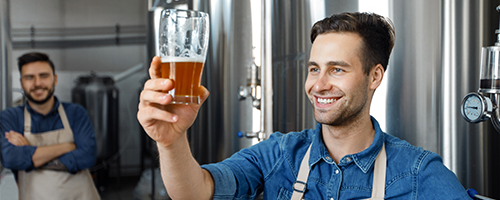
Beer Social Sustainability: A Brewer's Guide
May, 2024
Beer Social Sustainability: A Brewer's Guide
Beer is more than just a refreshing beverage; it also significantly impacts social sustainability and people. Understanding the social sustainability of beer is crucial in today's society, where consumers are increasingly conscious of the social and environmental impacts of the products they consume.
There are three aspects of sustainability
- Environmental Sustainability
- Social Sustainability
- Economic Sustainability
In our previous post, we discussed breweries impact on environmental sustainability. This blog addresses how social sustainability in breweries can support positive change.
Unpacking Social Sustainability in Brewing
When we talk about social sustainability in the brewing industry, we are referring to the efforts taken by brewers to impact society positively. It's about considering sustainability's economic, social, and cultural aspects and striving to foster a fair and responsible brewing industry.
As the brewing industry continues to grow and evolve, there is an increasing focus on social sustainability. Social sustainability refers to the impact of beer production on people and communities, encompassing various aspects, from supporting local farmers to contributing to economic growth. Breweries have a unique opportunity to impact local communities with these contributions, but the responsibility of producing safe products falls into the social sustainability category. It's about brands implementing food safety programs to ensure critical ingredients like heavy metals stay below legal limits (e.g., arsenic). It also emphasizes correctly handling hazardous substances to avoid negative impacts on operator safety or the local community, such as reducing waste and using waste removal options that are best for the local community. By prioritizing social sustainability, brewers can build trust and loyalty with consumers increasingly conscious of their beer choices' impact on the world around them.
The Environmental Stakes of Brewing
While brewing beer is a beloved tradition bringing people together, it's critical to recognize the environmental challenges associated with it. From how we source ingredients to our approach to waste management, brewing has a significant environmental footprint. Agricultural practices like chemical fertilizers and pesticides can lead to soil degradation, water pollution, and habitat destruction.
Another challenge lies in ingredient sourcing. DE has been the preferred method for filtering beer, but its use conflicts with sustainability principles due to its high CO2 footprint, energy consumption, and potential for waste and metal exposure. Without proper management, these waste products can end up in landfills, contributing to pollution and greenhouse gas emissions. Our focus on crossflow membrane filtration eliminates the need for DE, resulting in significant savings.
Embracing Innovation and Technology for Sustainable Brewing
As a forward-thinking company, Pall has been a technology leader with the courage and foresight to set up more sustainable products proactively. We're committed to helping breweries minimize their environmental impact. Our innovative filtration and separation solutions allow breweries to conserve water, reduce energy consumption, and ensure the quality of their beer. We're proud to align our expertise with the industry's focus on social responsibility. Here's just one of the ways our solutions support social sustainability:
Social Sustainability Challenge | Impacts on social sustainability | Pall solution – Successful DE Replacement |
|---|---|---|
Diatomaceous Earth (DE) Powder | Exposure to DE Powder poses a cancerogenic risk if inhaled.
Accumulation of solid waste running to hundreds of tons per year, which in many countries and states requires treatment as a hazardous waste.
There is a possibility of metal ions from DE leaching into the beer, which could affect product quality and food safety. | In the early 2000’s Pall decided to stop producing DE (diatomaceous earth) or Kieselgur filters. In a time when DE usage was dominating technology to filter beer, we focused on innovations in crossflow membrane filtration for beer clarification, eliminating the need for DE in beer production. |
Keeping Up with Consumer Preferences for Socially Responsible Beer
The rise of conscious consumerism in the beer industry is driving an increased focus on social sustainability initiatives by breweries. As consumers become more aware of the environmental and societal impact of their purchasing decisions, they seek breweries that align with their values.
Breweries recognize this shift in consumer preferences and communicate their social sustainability initiatives more openly. They understand that consumers are more likely to support brands committed to making a positive difference. You can learn more about the consumer demand for sustainable beer in our recent survey of beer drinkers across the globe. Learn more here.
You can download our full technical article on improving the sustainability of brewing by completing the form.
To access the full sustainability paper, complete the form below.
- Category
- Author
- Sort By




